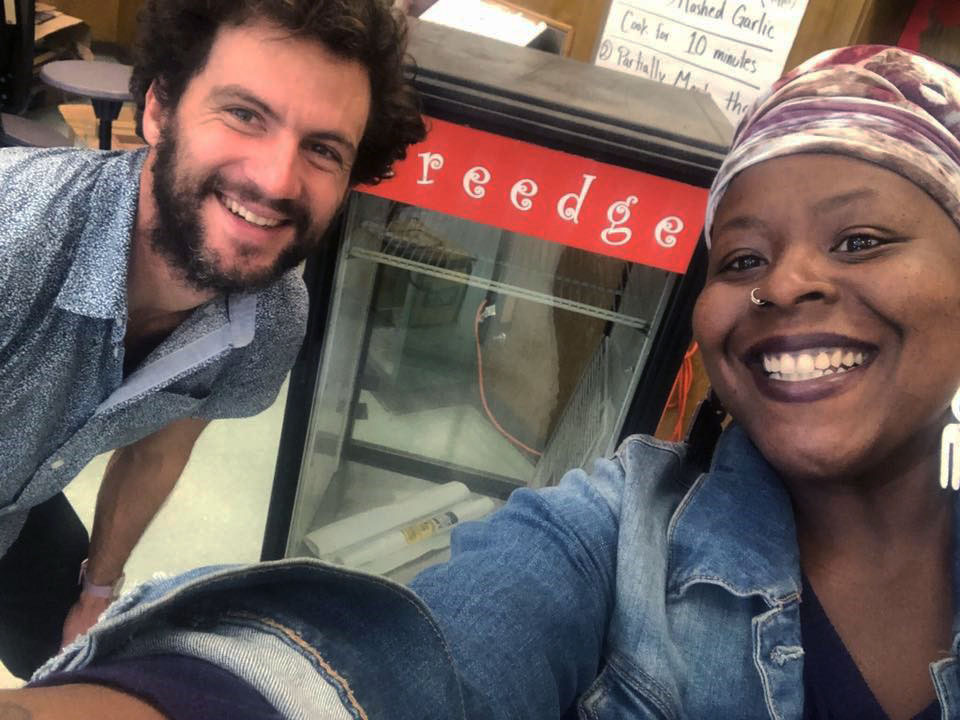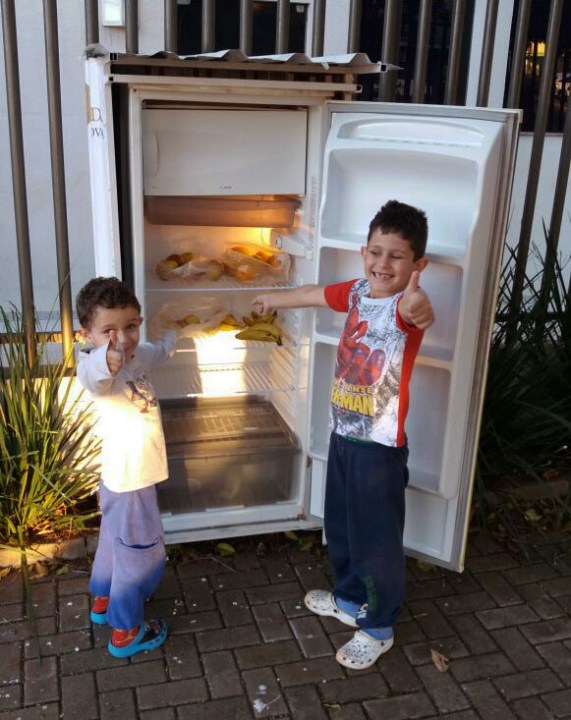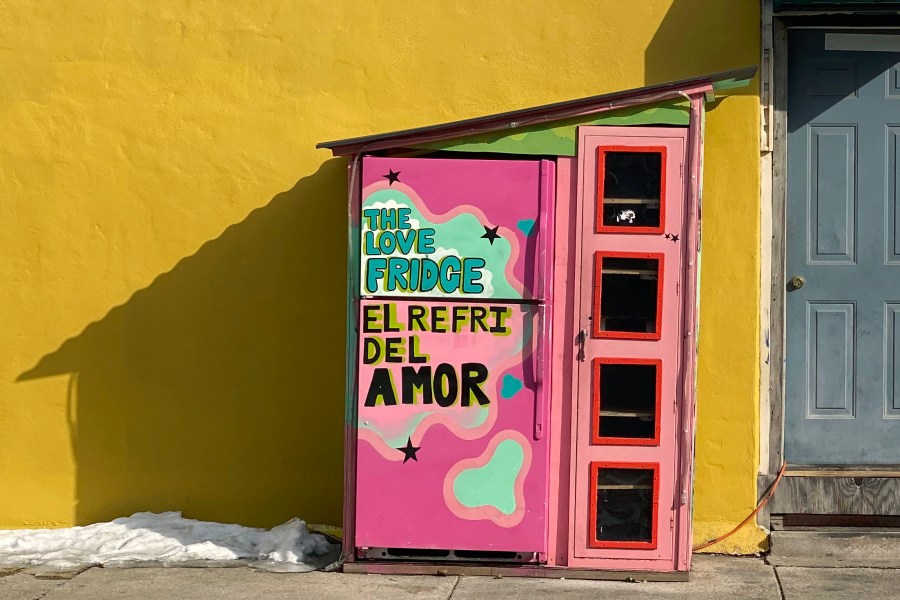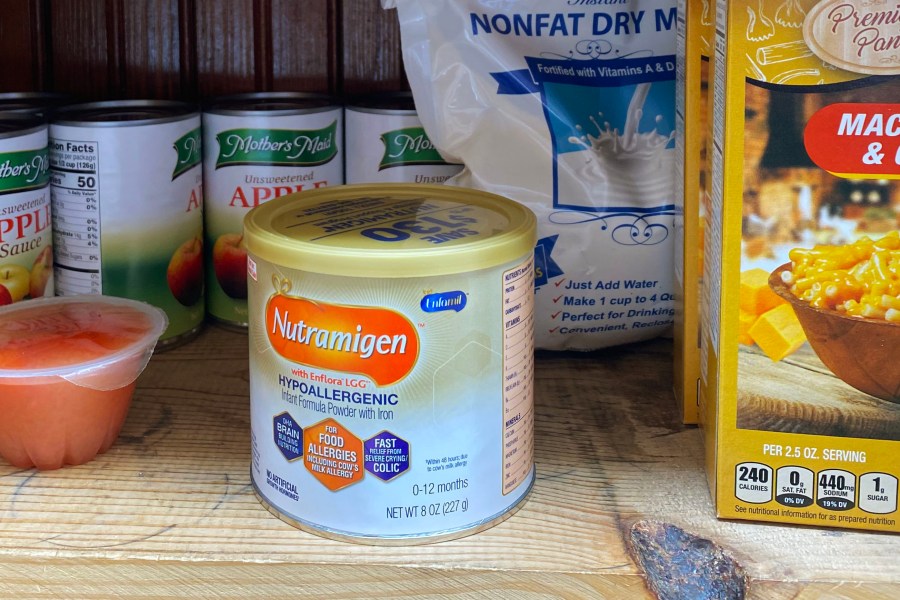Community fridges: A cool idea boosted by COVID crisis

Community fridges located around the world have been a source of food security during the pandemic. Mary Hall/NewsNation, Courtesy of Ernst Bertone Oehninger.
CHICAGO (NewsNation) — For years, Ernst Bertone Oehninger had a dream: refrigerators, plopped in front yards and public spaces, and filled with free food for anyone who wanted it.
It just wasn’t catching on in the United States.
But then came the coronavirus. During the summer of 2020, 30 million Americans said they didn’t have food to eat. Traditional food pantries and soup kitchens struggled to keep up. The “community fridge” movement picked up steam.
Oehninger helped co-found Freedge, which in 2014 started with 10 community fridges in Northern California. Now these local acts of generosity — named everything from “Free Fridges” to “Sharing Fridges” to “Food Tubs” — are across the United States in places such as Fort Collins, Colorado, Aurora, Illinois, Conway, Arkansas, and Rock Hill, South Carolina.
People go to the grocery store and on their way home stock the “freedges” with the same fresh produce or meat they’re buying for their own families. Some locations include adjacent shelves for dry goods like baby food or canned fruit. They’re checked at least daily, but otherwise left alone.
“The metrics of the success, it was really not the pounds of food,” said Oehninger, who was studying agronomy when he got involved with community fridges, but has now returned to his native Brazil. “It was like when we received a little note on the fridge saying, ‘Thanks for changing my day. I was very thirsty and I came here and there was a bunch of Gatorade in the fridge.’”
NewsNation spoke with Oehninger about the growing community fridge movement, how it works, its chances of thriving post-pandemic, and how it could contribute to solving the problem of hunger in America. This interview has been edited for length and clarity. Find a map of community fridges at the bottom of the article.
NewsNation: How is a community fridge different from a food pantry or soup kitchen? What problem does it solve?

Oehninger: The 24/7 aspect — open after hours and catering to populations that normally can’t go to the food bank or don’t want to … because they don’t want to be ashamed — we have this anonymous system that is giving food regardless of who you are.
There’s a stigma around poverty … and so regardless of having a house or not, people are ashamed of being poor.
If you have to work three jobs to make ends meet or to pay rent and then some months (you can’t), you’re going to have to go to the SNAP food stamp program and say, “Hey, I’m poor this month.” (You’d) have to go through the bureaucracy of proving that (you’re) poor so (you) can have access to canned food.
NewsNation: Why do you think this approach works?
Oehninger: It breaks a few conceptions that people have about food, liability, or food safety, or poverty. And that’s why I think people are still talking about it even two years after the pandemic. One of the biggest things about the pandemic is that we learned … we depend on each other.
The idea of a fridge, it’s very common. I think that what triggers movements is when someone sees that other people did it, and they’re like, “Oh, yeah. I’m going to do it, too.”
Once we put a bunch of fridges in our area … we reached a point in which we’re like, “OK, now, we have something that works.”
NewsNation: Can you explain what “mutual aid” is and how it’s different from charity?
Oehninger: (Mutual aid) is just when you help someone without expecting anything in return … groups of people who have a goal to nourish their community, to feed their community, to provide basic needs for the community, like housing, or health care.
Mutual aid is superior because of the nonhierarchical aspect. It’s common for food banks to tell volunteers not to take food home. This will never happen in a mutual aid organization. … Volunteers are volunteers because they want to make sure that their community is (benefiting from) the work that they’re doing.
NewsNation: How did the pandemic jumpstart the idea of community fridges?
Oehninger: It really seemed that in the U.S., things wouldn’t (take off). … We had many years of struggle with those questions — about the stigma of poverty, homelessness, the question about liability.
I think we needed many years to break that — and I don’t think we broke that. I think that the pandemic broke that.
We locked down, there’s all sorts of needs ramping up and then people are like, “OK, we need to do something about (food insecurity),” and then like, “Oh, let’s put fridges.” I think the pandemic … made us see things that we couldn’t see before.

NewsNation: It seems that because this is local, communities can address their own needs and not worry about a big national organization. But that can also hurt, too. New fridges often have to navigate local health code restrictions. Are there other challenges?
Oehninger: “You’re going to have to have everybody on board, and you’re going to have to do consensus decision-making. And that means that every person in the group can, or has to, come up with a proposal, if they don’t agree with what’s being said.”
NewsNation: What have you learned from the community fridge movement?
Oehninger: The actual reason for us doing the community fridges was beyond the food itself. Yes, we want to change the food system and … we want people to have food.
But I think that the community fridge, for us, was more like a symbol. I think what the fridge does the best is triggering some questions in the minds of the people who see the fridge.
You have a sense of community, that someone is bringing food here to another person and someone can come and take that food. … The person who installed the fridge there, the person who brought the food, and the person who took their food — all of them benefited from the food.
NewsNation: Lots of organizations had a “pandemic bump” where they did better because of the COVID-19 crisis. Will the community fridges be one of those groups?
Oehninger: COVID is not the first crisis, nor the last, that we’re going to have. What is the same in every crisis is a pattern that poor people will suffer the most. COVID was just the trigger of this big explosion of mutual aid in the U.S. And I think that is good that that happened. Maybe when the next crisis comes, we will be better prepared.
To learn more about community fridges, where to find them in your community and how to set one up, click here.











